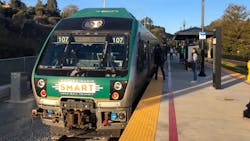SMART’s green commuters reduced greenhouse gas emissions by 33 percent compared to using an automobile
Sonoma-Marin Area Rail Transit (SMART) riders reduced greenhouse gas emissions by 33 percent compared to completing the same trip in a car, according to a Green Commute fact sheet released by SMART following a study on the agency’s impact on greenhouse gas emissions.
To date, SMART riders have prevented 8.1-million pounds of carbon dioxide (CO2) emissions from being released into the environment—equivalent to 4,770 acres of forest carbon sequestration.
The agency says it is pleased to report that many of its riders continued this positive impact of reducing emissions by connecting to and from the train station using low emission forms of transportation, such as walking, biking and other public transit. About 50 percent of SMART riders walk or take other public transit, while approximately 14 percent ride a bicycle.
“SMART is undeniably a critical transportation option that results in far fewer greenhouse gas emissions than a single occupancy car use,” said Suzanne Smith, executive director of the Sonoma County Transportation Authority and Regional Climate Protection Authority. “We need SMART. We need all of the tools available to reduce emissions from the transportation sector.”
SMART Board Chairman Eric Lucan added, “Even though SMART is still in its infancy, each month thousands of people across the North Bay are making a green choice by riding on SMART to get to work, school, shopping and for leisure trips. They choose SMART not only for the environmental benefits but also for the ease of being able to leave the car behind and avoid the stress of sitting in bumper-to-bumper traffic congestion.”
With each SMART train able to carry 158 seated passengers, and cars during the commute carrying an average of 1.08 passengers (according to the American Community Survey 2019 and California Air Resources Board EMission FACtor Sonoma County data), this equates to each SMART train reducing traffic congestion by eliminating 146 cars idling in traffic. SMART commuters free up 12.8 miles of roadway each weekday.
SMART says a contributing factor to its environmental benefits are the agency’s clean-diesel trains, which are equipped with modern, efficient engines that meet the Environmental Protection Agency’s Tier 4 emission standards, cutting particulate matter emissions by 96 percent and NOx emissions by 93 percent compared to regular diesel engines.
